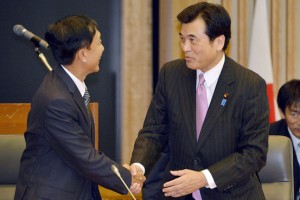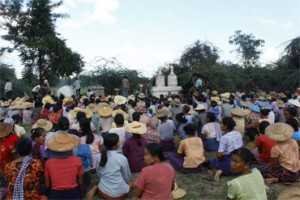Campaign Updates (695 found)
Civil Society Denounces Adoption of Flawed ASEAN Human Rights Declaration: AHRD Falls Far Below International Standards
Disregarding the deep concerns expressed by senior United Nations officials, human rights experts and hundreds of civil society and grassroots organisations at the national, regional and international levels, ASEAN leaders nonetheless adopted […]
• • •APF Membership Expands to 19
The Myanmar National Human Rights Commission was admitted as the APF’s 19th member institution at this year’s APF Annual Meeting, held in Amman, Jordan, on 5 November 2012.
The APF Forum Council unanimously approved the Commission’s application for associate membership […]
• • •Statement from the Burma/Myanmar Delegation to the Solidarity for Asian Peoples Advocacy (SAPA) Workshops in Relation to the 21st ASEAN Summit in Cambodia
This week, under the aegis of the ASEAN Grassroots Peoples Assembly, the Solidarity for Asian Peoples Advocacy (SAPA) organized four regional workshops. The SAPA workshops offered a free, independent and inclusive platform for regional and national civil society organizations […]
• • •Civil Society Rejects Flawed ASEAN Human Rights Declaration
Today, 62 grassroots, national, regional, and international civil society groups are calling upon ASEAN Member States to postpone the adoption of the ASEAN Human Rights Declaration, which is not worthy of its name […]
• • •World Bank Breaches Own Policy and Ignores Civil Society’s Request for Postponement of Project
On 1 November, the World Bank’s Board of Directors decided to go ahead with a US$80 million Community Driven DevelopmentProject, despite Myanmar civil society organization’s official request to postpone the project until the World Bank holds […]
• •New Lending Must Address Challenges on Burma’s Road to Development
 On 11 October, Japan announced that it would be resuming loans to Burma. It also hinted that it will assist the heavily indebted country in clearing its arrears and establishing good financial standing with international financial institutions, such as the World Bank and the Asian Development Bank.
On 11 October, Japan announced that it would be resuming loans to Burma. It also hinted that it will assist the heavily indebted country in clearing its arrears and establishing good financial standing with international financial institutions, such as the World Bank and the Asian Development Bank.
Japan will be forgiving US$3.7 billion or about 60% of the total $6 billion debt Burma owes; it is also planning to use bridge loans by Japanese banks to help clear Burma’s $900 million of arrears with the World Bank and the Asian Development Bank. Japanese Finance Minister Koriki Jojima stated, “Japan is planning to resume its full program in Myanmar with yen loans to help support Myanmar’s sustainable economic development…at the earliest possible timing next year.” He further explained that Japan’s development priorities in Burma would focus specifically in the areas of electricity and road rehabilitation, rural development and improvement of port facilities.
At this moment in time, Burma’s re-entry into the world economy, specifically the ability to take loans from institutions such as the World Bank, the Asian Development Bank and Japan itself, carries great risk. The type of projects to be funded, the rate of investment, the sectors in which investment will take place, the presence of monitoring mechanisms, and the decision-making process are just some of the factors that will determine the long-term outcome of international financial support […]
Both Sides File Suits in Mine Protest
 Over 1,000 villagers staged a symbolic demonstration on Tuesday at a graveyard to dramatize their struggle against a Chinese co-owned mine in the Letpadaung mountain range near Sagaing Division’s Monywa city.
Over 1,000 villagers staged a symbolic demonstration on Tuesday at a graveyard to dramatize their struggle against a Chinese co-owned mine in the Letpadaung mountain range near Sagaing Division’s Monywa city.
The villagers are protesting their displacement from land following months of confrontations with the company and the authorities […]
• •Burma Activists Say Funding Initiatives Could Undermine Peace Process
Burma activists say international funds established to encourage peace in ethnic rebel areas risk undermining the process. Critics say the Norway and World Bank-led “peace funds” are prioritizing development instead of lasting political solutions. Norway’s ambassador refutes that notion and says their whole point is a lasting peace.
The aid plans were launched earlier this year by Norway, the World Bank, European Union, United Kingdom, United Nations and Australia […]
•LAND NOT FOR SALE!: Letter of Global Solidarity against Land Grabs in Burma/Myanmar
The current reforms in Burma/Myanmar are worsening land grabs in the country. Since the mid-2000s there has been a spike in land grabs, especially leading up to the 2010 national elections. Military and government authorities have been granting large-scale land concessions to well-connected Burmese companies. Farmers’ protests against land grabs have drawn recent public attention to many high profile cases, such as Yuzana’s Hukawng Valley cassava concession, the Dawei SEZ in Tanintharyi Region near the Thai border, Zaygaba’s industrial development zone outside Yangon, and the current Monywa copper mine expansion in Sagaing Division, among many others […]
• • •World Bank returns to Burma amid criticism
After leaving over suspended debt repayment in the late 1980s, the World Bank officially returned to Burma, also known as Myanmar, in early August. It signed off $85 million in grants, but no loans will be approved until the $400 million Burma still owes to the Bank are cleared. Concerns remain that the Bank is failing to engage constructively and transparently with civil society […]
• • •








 All posts
All posts